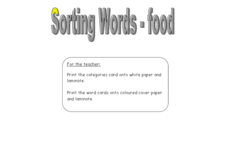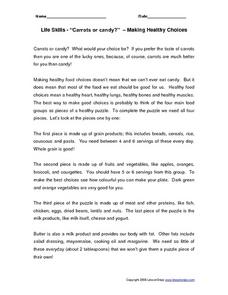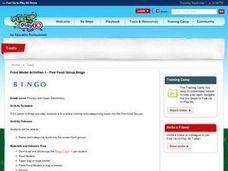Curated OER
Food Groups
In this food groups worksheet, students choose two words from the word list that belong in each of 7 food group categories. The groups are: dairy, poultry, grains, proteins, vegetables, fruits and junk food.
Curated OER
Sort the Foods
In these food groups worksheets, students read the various fruit, vegetable, meat, and dairy words. Students categorize the words into groups by cutting them out and pasting them into the table.
Curated OER
Food Matching
In this food matching worksheet, students cut out text and picture cards. Students match the 12 food pictures to the appropriate food description cards.
Curated OER
Food For Energy - Four Food Groups
Students consider how food is converted to energy. In this science lesson plan, students explore the importance of eating properly with a balanced diet as they study 4 food groups.
Curated OER
The Pyramid Power is Yours
For this food group worksheet, 3rd graders complete a word search. Students locate the names of each food group within the pyramid.
Curated OER
Introduction to Nutrition
Students investigate the five food groups. In this nutrition lesson, students track their food over the weekend, and see if they are eating healthy. Then students get an opportunity to track their eating again to see if it improves.
Curated OER
My Favorite Food!
In this food groups worksheet, students circle the item in each group of food that is their favorite. Students choose items from fruits, vegetables, drinks, and sweets.
Curated OER
Food Groups
In this diet and health worksheet, students draw examples of food from 4 food groups which include fruit and vegetables, meat and alternatives, dairy products, and grains.
Curated OER
Exploring Food Groups
For this food group worksheet, students complete a graphic organizer. Students identify food groups found in each "combination" food.
Curated OER
Worksheet 4. Food Groups
In this food groups worksheet, students choose 2 words or phrases from the word pool that belong in each food category. There are 7 food categories to fill in.
Curated OER
The Five Food Groups
In this food groups worksheet, students use the colorful 7 day diary to color a star for each food group eaten each day. Students do not record how many servings from each group, just that they have eaten a food from it.
Curated OER
Life Skills-"Carrots Or Candy?"- Making Healthy Choices
In this healthy food choices worksheet, students label and color 4 puzzle pieces to represent the food groups. Then students complete a graphic organizer filling in the food group headings and food items that fit in each category.
Curated OER
How Do People Get Energy?
In this food energy instructional activity, students will write in examples of different foods that fit into the four food groups: grains, protein, fruits and vegetables, and milk products.
Curated OER
Food Groups
For this food group worksheet, students will focus on vocabulary enhancement. Students will complete 7 multiple choice questions by reading each question and choosing the answer that depicts what is pictured to the left of each question.
Curated OER
THE FOODS WE EAT
Students discuss the five food groups and the seven basic nutrients. They decorate Food We Eat booklet pages with pictures of foods found on background, rubber stamp and animation tools in KidPix. (Booklet has a page for each food group.)
Curated OER
ADULT ESOL LESSON PLAN--Level 2--Health and Nutrition
Students, while extensively reviewing the vocabulary terms on the board, examine basic food groups along with their food labels to help maintain a healthy dies for proper health.
Curated OER
ESOL: Health and Nutrition
Students explore the four food groups and how they contribute to one's health. They identify the four food groups and create a poster of the four food groups with pictures. They present their posters to the class and practice answering...
Curated OER
Fod Pyramid
Sixth graders investigate the Food Pyramid and how it relates to their own diet. They conduct Internet research, complete the "Rate Your Plate" online activity, and create a HyperStudio presentation.
Curated OER
Introduction to Farming in the United States
Learners discuss basic foods and what constitutes a well-balanced meal. They identify four basic food groups, and identify food sources, such as farms.
Curated OER
What Does Being Healthy Mean? How Can We Promote Healthy Lifestyles?
Students examine the main food groups. They examine their lifestyles and examine ways to promote healthier lifestyles in young people in order to present a Healthy Living Week.
Curated OER
Familiarizing Students with the 5 Food Groups
Students review a variety of foods and classify them into food groups. They identify the benefits of each food group to our bodies and consider how deficiencies of these groups affect humans. They sort pictures, view a video and write...
Curated OER
Healthfully Ever After
Second graders discuss five food groups and healthy eating habits.
Curated OER
Five Food Group Bingo
Students practice naming and categorizing foods by playing Five Food Group Bingo.
Curated OER
Meet the Royal Food Family
Second graders use mini-books, posters, songs, trading cards and sorting activities to explore the five food groups needed for health: vegetables, fruits, grains, milk and meat. They discuss why good nutrition is important.

























